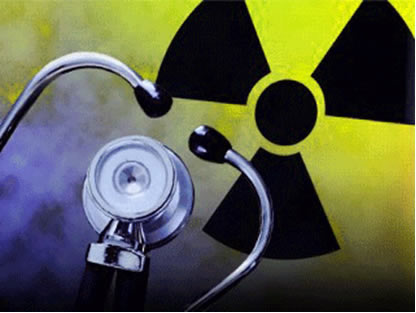New Medical Dilemma : Study Confirms Low Doses Of Radiation As A Result Of X-Rays And CT Scans Contributes To Cancer
Source: Thailand Medical News Jul 22, 2019 6 years, 7 months, 5 days, 10 hours, 49 minutes ago
Researchers from the University of Cambridge and Wellcome Sanger Institute have discovered that low doses of radiation equivalent to three CT scans, which are traditionally considered safe by the medical community, in reality actually gives cancer-capable cells a competitive advantage over normal cells in healthy tissue.

It was discovered that low doses of radiation increase the number of cells with mutations in p53, a well-known genetic change associated with cancer. However, giving the animal models an antioxidant before radiation promoted the growth of healthy cells, which outcompeted and replaced the p53 mutant cells. The results confirmed that low doses of radiation promote the spread of cancer-capable cells in healthy tissue and the researchers recommend that this risk should be considered in assessing radiation safety. The study also offers the possibility of developing non-toxic preventative measures to cut the risk of developing cancer by boosting our healthy cells to outcompete and eradicate cancer-capable cells.
Individuals each day are exposed to various sources of ionizing radiation, including natural radiation in soil and rock, mobile phone towers and important medical procedures like CT scans and x-rays. Low doses of radiation, such as the exposure from medical imaging, used to be considered safe as they were thought to cause little DNA damage and apparently minimal effect on long-term health. Until now, other effects of exposure to low levels of radiation have remained hidden, meaning understanding the true risk associated with low doses of radiation has been difficult and there has not been much studies done on them.
It has been a known fact through previous studies that our normal tissues, like skin and even the organs, are battlefields where mutant cells compete for space and nutrients against healthy cells. We all have cancer-capable mutant cells in healthy tissues, including those with p53 mutations, which increase in number as we age or if we are under inflammations, yet very few actually go on to form cancer.
In this breaking study, the team from Cambridge University and Wellcome Sanger showed that low doses of radiation weigh the odds in favour of cancer-capable mutant cells in the esophagus. The teams gave animal models a 50 milligray dose of radiation, equivalent to three or four CT scans. As a result, the p53 mutant cells spread and outcompeted healthy cells.
"Human bodies are the set of 'Game of Clones', a continuous battle for space and nutrients between normal and mutant cells. We show that even low doses of radiation, similar to three CT scans, can weigh the odds in favour of cancer-capable mutant cells. We have discovered an additional potential cancer risk as a result of radiation that needs to be recognised."said Dr David Fernandez-Antoran, lead author from the Wellcome Sanger Institute,in an exclusive interview with Thailand Medical News.
Same study also shows that taking antioxidants prior to X-rays and CT-Scans is a good preventive measure.
When the team administered to the animal models an over-the-counter antioxidant, N-Acetyl Cysteine (NAC) -, before exposure to the same level of radiation, it was discovered that the antioxidant gave normal cells the boost needed to outcompete and eradicate the p53 mutant cells. However, the antioxidant alone without exposure to radiation did not help normal cells battle the mutant cells.
M
edical imaging procedures using radiation, such as CT scans and x-rays, have a very low level of risk , so low that it is hard to measure. This research is helping us understand more about the effects of low doses of radiation and the risks it may carry. More research is needed to understand the effects in people. The team suggests this research also highlights the possibility of developing therapies to prevent cancer. By making healthy cells fitter they naturally push out cancer-capable cells, without any toxic side effects for the patient.
Reference:David Fernandez-Antoran, Gabriel Piedrafita, Kasumi Murai, Swee Hoe Ong, Albert Herms, Christian Frezza, Philip H. Jones. Outcompeting p53-Mutant Cells in the Normal Esophagus by Redox Manipulation. Cell Stem Cell, 2019; DOI: 10.1016/j.stem.2019.06.011 studied the effects of low doses of radiation in the esophagus of mice.
